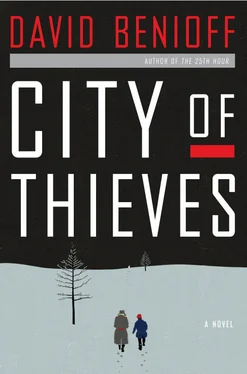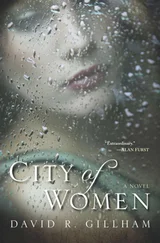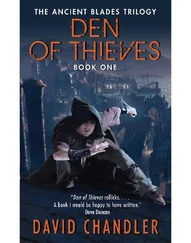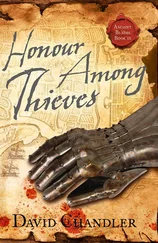The bald lieutenant escorted me to one of the machine-gun emplacements in front of the mansion, where a band of soldiers sat behind stacked sandbags, sipping weak tea from tin cups. The sergeant in charge read the colonel’s letter, glanced at me, and said, “You have something for him?”
I nodded and he beckoned for me to follow him. The lieutenant turned and walked away, never looking back, eager to escape what had turned into an unfortunate morning for him.
We finally found Grechko downstairs in the mansion’s wine cellar. All the grand old bottles of wine had been drunk long ago, but the walls were still honeycombed with terra-cotta racks. The colonel stood beside one of his subordinate officers, who checked items off a list. Young soldiers opened wood crates with crowbars. They dipped their arms into the shredded paper protecting the contents, pulling out tins and jars and burlap sacks and calling out the contents.
“Two kilos of smoked ham.”
“Five hundred grams of black caviar.”
“Kilo of jellied beef.”
“Garlic and onions… no weight listed.”
“Kilo of white sugar.”
“Kilo salted herring.”
“Boiled tongue, no weight listed.”
For a minute I stood and watched as the pile of foodstuffs grew, all the ingredients for a legendary feast. Carrots and potatoes, plucked chickens and jars of sour cream, wheat flour, honey, strawberry jam, jugs of fermented cherry juice, canned borovik mushrooms, blocks of butter wrapped in wax paper, a two-hundred-gram bar of Swiss chocolate.
The sergeant escorting me whispered a word to the officer standing beside Grechko. The colonel heard him and turned my way. For a few seconds he frowned, unable to place me, the deep furrows splitting his forehead.
“Ah,” he said, his strange, beautiful smile emerging. “The looter! Where’s your friend, the deserter?”
I don’t know how my face reacted to this question, but the colonel saw and understood.
“Too bad,” he said. “I liked that boy.”
He waited for me to do something and for a long count I couldn’t remember why I was there. When it came back to me, I unbuttoned my coat, pulled the slatted, straw-stuffed box out from under my sweater, and handed it over.
“A dozen eggs,” I told him.
“Wonderful, wonderful.” He gave the box to his underling without looking at it and gestured to the delicacies heaped on the stone floor. “Airlifted some provisions in last night. Just in time. You know how many owed favors I had to spend on this wedding?”
The subordinate officer handed the egg box to one of the young soldiers and made a mark in his book. “Another dozen eggs.”
I watched the soldier walk away with the box.
“You already have eggs?”
The subordinate checked his book. “That’s four dozen now.”
“The more the better,” said the colonel. “Now we can make fish pies. Here, give the boy a Grade One ration card. Ah, give him two; he might as well have his friend’s.”
The subordinate raised his eyebrows, impressed with this generosity. He pulled two ration cards from a leather wallet and signed them. He took an inkpad from his pocket and stamped the cards before handing them to me.
“You’ll be a popular boy,” he said.
I stared at the cards in my hand. Each one entitled me to an officer’s rations. I looked around the cellar. Kolya would have known which vineyards the Dolgorukovs preferred, the white they chose for sturgeon, the red best paired with venison. Or if he didn’t know, he would have made it up. I watched soldiers walk upstairs carrying sacks of rice and long strings of fat sausage.
When I turned toward the colonel, he stared right back at me. Again he understood my expression.
“Those words you want to say right now? Don’t say them.” He smiled and cuffed my cheek with something close to real affection. “And that, my friend, is the secret to living a long life.”
On the night of January 27, 1944, more than three hundred cannon fired an hour-long fusillade of white, blue, and red rockets, the brilliant, glittering tails lighting up all of Leningrad, the Russian colors reflected in the gold dome of Saint Isaac’s and the two thousand windows of the Winter Palace. The siege was over.
I stood on the rooftop of Sonya’s building, drinking bad Ukrainian wine with her and a dozen other friends, toasting the names of Govorov and Meretskov, the generals who had broken through the German lines. By that time I had been in the army for over a year. My superiors had sized me up, decided I didn’t have the look of an infantryman, and assigned me to duty at Red Star , the army’s newspaper. My job that first year was to assist a team of experienced journalists traveling around the front, gathering anecdotes and quotations from soldiers in the various units we visited. I carried a rifle but never used it. My missing half finger bothered me only when I typed. Eventually I earned a promotion and began sending my own reports to the Red Star offices, where an editor I never met converted my submissions into sturdy, patriotic prose. My father would have hated all of it.
The night the siege ended, up on Sonya’s roof, after we had drunk too much wine and shouted till our throats hurt, I kissed her on the mouth. It was more than friendly and less than erotic. When we stepped apart, smiling to cover our embarrassment, I know we both thought of Kolya. I imagine he would have been delighted to see me kissing a pretty girl, he would have coached me on my technique and insisted on a firmer touch—but still, we thought of him and we never kissed that way again.
A few days after I had returned to Piter with the colonel’s eggs, I learned that the Kirov did not collapse until hours after the bombs struck. Most of the residents had survived, including Vera Osipovna and the Antokolsky twins. I ran into each of them eventually, but the winter had changed us all and there was little to say. I had hoped Vera would feel mildly guilty for running away without looking back after I had saved her at the courtyard gates, but she didn’t mention it and I didn’t bring it up. She had already earned a seat in the city’s depleted orchestra and she kept it for the next thirty years. The twins both fought with distinction in General Chuikov’s Eighth Guards, making it all the way to Berlin. There is a famous photograph of one of them signing his name on the Reichstag wall, but I could not tell you if it was Oleg or Grisha. Of all the fifth-floor Kirov kids, I suppose I am the least accomplished.
In the summer of 1945 I lived in a large apartment near the Moscow Station with two other young journalists. The evacuees had returned to Piter by then, including my mother and sister, but the city remained far less crowded than it had been before the war. People said water from the Neva still tasted like corpses. Boys ran home from school again, swinging their book bags. The restaurants and shops of Nevsky Prospekt had reopened, even though almost no one had money to spend. On state holidays we all strolled up and down the street, staring through new plate glass windows at the marzipan treats and wristwatches and leather gloves. Those of us who had lived through the siege stayed by habit on the south sidewalk, though no shells had landed for nearly two years.
One cool August night, the north wind blowing down from Finland with the scent of pine needles, I sat alone at the kitchen table of my apartment, reading a Jack London story. My roommates had gone to see a new play at the Pushkin; I’d been invited, but there was no contemporary Russian playwright I liked as much as Jack London. When I finished the story, I decided to read it again from the beginning, this time trying to figure out how he had written it. Buck did not read the newspapers, or he would have known that trouble was brewing….
Читать дальше












